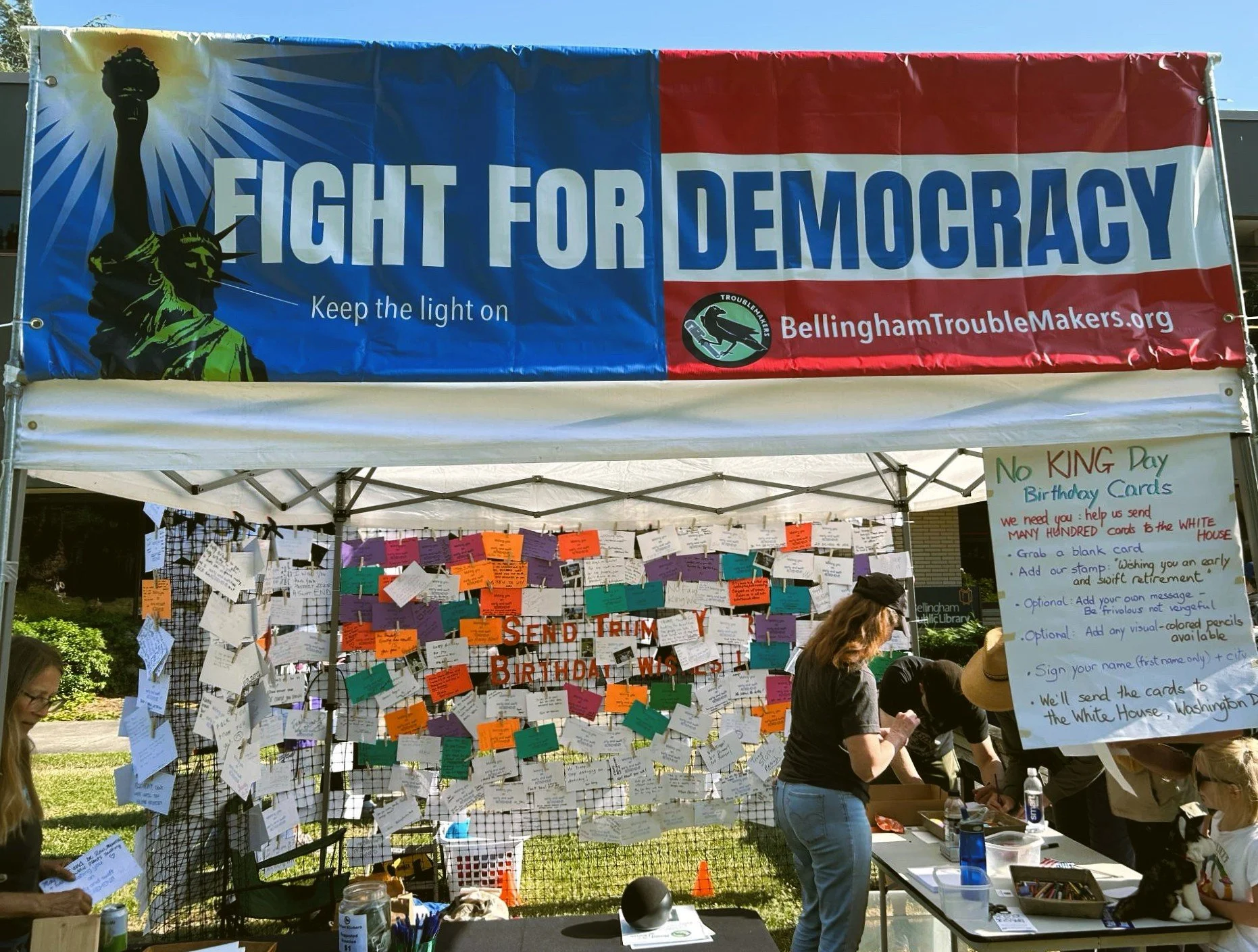Who we are
We are a growing collective in and around Bellingham committed to building a multi-racial, multi-generational, cross-class movement for justice and democracy. Through strategic nonviolent direct action, training, and solidarity, we resist authoritarianism, protect the planet, and challenge systems of oppression. Together, we create good trouble — finding joy, deepening connection, and raising a ruckus on the path to a freer, more humane world.
Our commitment is clear: we will strengthen democracy and resist authoritarianism through creative strategy, mutual aid, solidarity, and nonviolent resistance.
We do not obey in advance.
We prioritize joy.
We take up space.
We act in solidarity.
We organize.
Troublemakers - Bellingham
What we do
We design and carry out bold, creative, and strategic nonviolent actions that resist authoritarianism, weaken the pillars of power and lay the groundwork for a more just and compassionate world.
We also educate and prepare our community through free trainings and talks on Nonviolent De-escalation, Peacekeeping, Know Your Rights, Organizing, and Nonviolent Direct Action.
In addition, we act in solidarity with others’ campaigns and struggles, partnering with pro-democracy and humanitarian organizations to build collective strength.
And because joy fuels resistance, we hold monthly organizing meetings and social gatherings to deepen relationships with each other and our neighbors. We raise a ruckus, celebrate life, and know the value of a good party.
Sending a message on the acid ball at Bellingham’s Waypoint Park
What WE BElieve
We believe in the transformative power of nonviolent direct action — what John Lewis called “good trouble.” Our strength lies in connection: with each other, our neighbors, and all who resist systems of racism, capitalism, sexism, heteronormativity, and colonialism.
Together, we can challenge injustice, act in solidarity, and nurture joy as we build a freer, more just world.
If you’re ready, join us!
Over 550 people signed “birthday cards” to Trump at the No Kings Rally in Bellingham, June 14, 2025
More Info
-
Why Nonviolence?
This isn’t just opinion—it’s backed by decades of rigorous, quantitative research on civil resistance. Studies show that nonviolent civil resistance is more strategic and more effective than violence when confronting democratic backsliding and rising authoritarianism.
Why Nonviolence Works
Higher Success Rates: Nonviolent campaigns are twice as likely to succeed as violent ones in achieving regime change or territorial liberation.
Broader Participation: Because nonviolence lowers the barrier to entry, movements can draw in far more people—including those unwilling to engage in violence. This diversity and scale strengthen legitimacy and power.
Long-Term Stability: Victories won through nonviolence are far more likely to lead to democracy and less likely to collapse into civil war.
Reduced Backlash: Violence often provokes repression and alienates the public. Nonviolence avoids playing into authoritarian narratives and is less likely to justify crackdowns.
Undermines Regime Legitimacy: Peaceful resistance exposes the state’s reliance on force, eroding its credibility at home and abroad.
The Strategic Imperative of Nonviolence
Strict, disciplined nonviolence is critical right now. Authoritarian leaders have vast resources, legal power, and media narratives to delegitimize dissent. Violence only strengthens their hand. To succeed, movements must:Mobilize mass participation: Research shows no government can withstand sustained resistance from as little as 3.5% of its population.
Win over the “big middle”: Nonviolent methods attract neutrals, passive supporters, and even moderate opponents who would never join a violent campaign.
Shift loyalties: Large, visible, disciplined movements increase the likelihood of defections from security forces and elites.
The Evidence is Clear
Nonviolent campaigns were twice as successful as violent ones in the 20th century.
Countries with nonviolent movements were 10 times more likely to democratize within five years than those with violent struggles.
Nonviolent revolutions lead to better long-term outcomes—stronger democratic institutions, rights-respecting security forces, healthier societies, and greater stability.
Nonviolence is not passive. It is power.
It is a strategy that builds movements big enough to win, undermines authoritarian legitimacy, and makes democratic transformation possible. Nonviolence is both effective and transformative—for those who practice it, for those who witness it, and for the societies it reshapes.
-
More coming soon!
-



